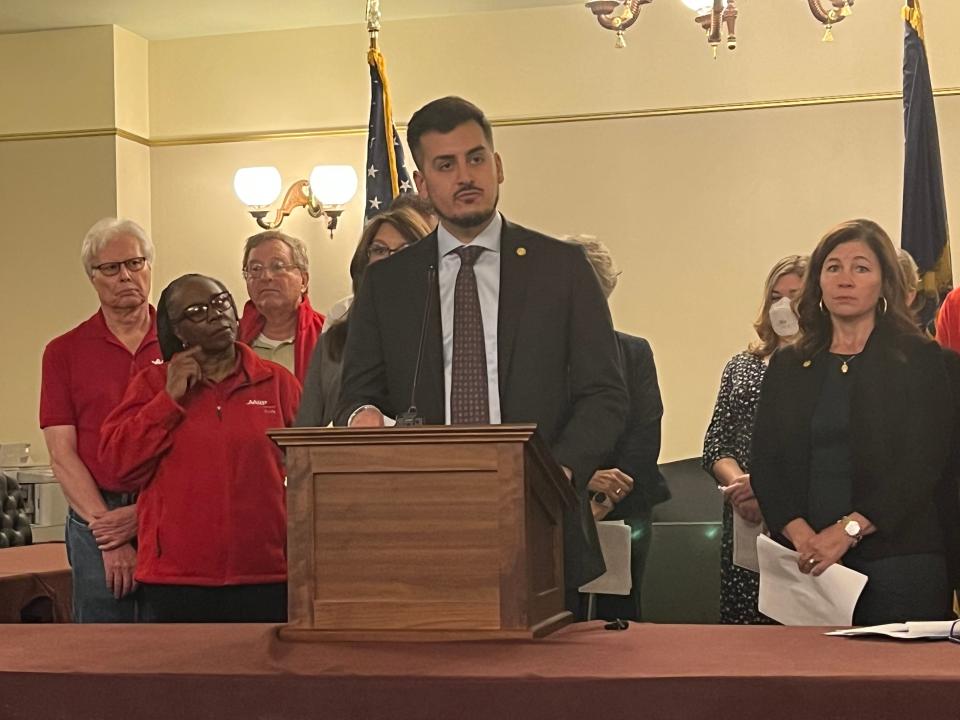Proposed 5-member board could cap costs on prescription drugs in Michigan
- Oops!Something went wrong.Please try again later.
LANSING — Senate Democrats will introduce legislation aimed at tackling rising costs for certain prescription drugs, they announced Tuesday, following a call from Gov. Gretchen Whitmer for the creation of a state board tasked with investigating prices and setting caps on increasing medicine costs.
The rising cost of prescription medication throughout the country has prompted at least six other states to create Prescription Drug Affordability Boards (PDABs). Speaking during a press conference, Sen. Darrin Camilleri, D-Brownstown Township, said lawmakers are poised to introduce bills to create one of the most aggressive PDABs in the country in Michigan.
"We want to ensure that we are targeting the most expensive drugs that we know are often very well used across Michigan so that we can drive down those costs for as many people as possible," Camilleri said. Senate Bills 483-485 were introduced by Camilleri, Sen. Veronica Klinefelt, D-Eastpointe, and Sen. Kristen McDonald Rivet, D-Bay City.

As envisioned, the Michigan PDAB would be able to set Upper Payment Limits (UPL), or a cap on the price that consumers pay, on prescription drugs. The board would also be able to investigate the effect of rising costs of the products on Michiganders.
Lawmakers said the PDAB would be a five-member body, with each member appointed by the governor, consisting of experts in health, health care, economics and supply chain. SB 483 states the governor could not appoint an individual who is employed by or affiliated with a company "that has the potential to bias or has the appearance of biasing the individual's decision in matters related to the board or in conducting the board's activities."
Advising the PDAB would be a 21-member Prescription Drug Affordability Stakeholder Council to direct the board on which drugs to investigate and potentially set consumer price limits on, McDonald Rivet said.
Legislative input would go into the stakeholder council's creation — seven council members would be appointed by the governor, seven by the Senate majority leader and seven by the House speaker. Council members could include health care workers, pharmacists, health insurance representatives and others, Camilleri said.
Three other states; Colorado, Maryland and Washington, have PDABs that can set price caps on prescription drugs, according to the National Academy for State Health Policy. The consumer price cap in Maryland only applies to public health plan enrollees. Michigan's plan looks more like those in Colorado or Washington, which apply price caps to the whole population.
Amid rising health care costs in the U.S., the cost of many prescription drugs has also risen, creating an affordability crunch throughout the country.
A report published last September by the U.S. Department of Health and Human Services found that more than 1,200 prescription drugs which increased in price from July 2021 to July 2022 increased at a rate greater than overall inflation. Among these products, the average price increase was around 32%, the report found. A separate study published last year by the Kaiser Family Foundation found that prices for more than half of drugs covered by Medicare increased at a rate greater than inflation from 2019 to 2020.
Those increases are burdening consumers. Almost a third of individuals paying out-of-pocket costs for prescriptions say they are a financial strain, a LendingTree survey found.
Advocates say the monetary squeeze can lead to difficult decisions when it comes to paying for prescriptions, and individuals may ration or even skip doses of medicine to save money. A National Institutes of Health study published in 2020 found 1 in 4 people needing insulin, a hormone used to convert blood sugar to energy, reduce taking insulin due to cost.
"This can be very detrimental, endangering people's health, livelihood and families," said Dr. Rob Davidson, executive director of the Committee to Protect Health Care. "It can cause serious health setbacks and put lives at risk." Davidson, an emergency room physician in west Michigan, said he recently encountered a patient who had to visit the emergency room after not being able to afford blood thinner medication costing $1,000.
Policy primer: Dems to end 24-hour abortion waiting period, ban on Medicaid funding of procedure
Sarah Stark, an insulin-dependent diabetic and patient advocate, said the rising cost of insulin is a constant concern for those with diabetes.
"Like many others, the price of insulin has been in the foreground of every major like decision I have ever had to make," she said. "The price of insulin has dictated my educational opportunities, my career path, and has dictated if and when I could start a family, when I could get married and if I should eat."
Whitmer called for the creation of a PDAB during her "What's next" address in August, as she outlined policy priorities for the fall. Camilleri said lawmakers are looking to advance the bills through the Legislature before it adjourns later this year.
"We want to be in a position as early as next year to start enacting some of those cost-saving measures across the board," he said.
Contact Arpan Lobo: alobo@freepress.com. Follow him on X (Twitter) @arpanlobo.
This article originally appeared on Detroit Free Press: Michigan Senate Dems propose prescription drug affordability board

